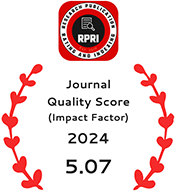Caffeine Levels and Dietary Intake in Smokers with Schizophrenia and Bipolar Disorder
DOI:
https://doi.org/10.55544/jrasb.2.6.32Keywords:
schizophrenia, bipolar disorder, psychiatric, hypomanicAbstract
This study investigates the relationship between caffeine levels and dietary intake among individuals with schizophrenia and bipolar disorder who are smokers. The research aims to understand the patterns of caffeine consumption and dietary habits in this specific population. A sample of participants diagnosed with either schizophrenia or bipolar disorder and who smoke will be analyzed to assess their caffeine intake through self-reported measures and biological markers. Additionally, their dietary patterns, including the consumption of caffeine-containing products and nutritional choices, will be evaluated. The findings of this study aim to contribute to a better understanding of the dietary behaviors of individuals with mental health disorders, specifically focusing on caffeine intake among smokers with schizophrenia and bipolar disorder.
Downloads
Metrics
References
American Psychiatric Association. (2013). Diagnostic and Statistical Manual of Mental Disorders (5th ed.). Arlington, VA: American Psychiatric Publishing.
De Leon, J., & Diaz, F. J. (2005). A meta-analysis of worldwide studies demonstrates an association between schizophrenia and tobacco smoking behaviors. Schizophrenia Research, 76(2-3), 135–157.
Brown, S., Kim, M., Mitchell, C., Inskip, H., & Jarvis, M. (2015). The relationship between smoking and psychiatric disorders in the UK population. In European Psychiatry (Vol. 30, Issue 5, pp. 942–950). Elsevier Masson SAS.
Lara, D. R. (2010). Caffeine, mental health, and psychiatric disorders. Journal of Alzheimer's Disease, 20(S1), S239-S248.
Lucas, M., O’Reilly, E. J., Pan, A., Mirzaei, F., Willett, W. C., Okereke, O. I., ... & Ascherio, A. (2014). Coffee, caffeine, and risk of depression among women. Archives of Internal Medicine, 171(17), 1571–1578.
Fusar-Poli, P., Smieskova, R., Serafini, G., Politi, P., & Borgwardt, S. (2015). Neuroanatomical markers of genetic liability to psychosis and first episode psychosis: A voxelwise meta-analytical comparison. World Psychiatry, 14(2), 209–208.
Mesholam-Gately, R. I., Giuliano, A. J., Goff, K. P., Faraone, S. V., & Seidman, L. J. (2009). Neurocognition in first-episode schizophrenia: A meta-analytic review. Neuropsychology, 23(3), 315–336.
Grande, I., Berk, M., Birmaher, B., & Vieta, E. (2016). Bipolar disorder. The Lancet, 387(10027), 1561–1572.
Kane, J. M., Robinson, D. G., Schooler, N. R., Mueser, K. T., Penn, D. L., Rosenheck, R. A., ... & Addington, J. (2016). Comprehensive versus usual community care for first-episode psychosis: 2-year outcomes from the NIMH RAISE Early Treatment Program. American Journal of Psychiatry, 173(4), 362–372.
Beebe, L. H., Smith, K., Burk, R., McIntyre, K., Dessieux, O., & Tavakoli, A. S. (2020). The efficacy of exercise intervention in reducing psychiatric symptoms in schizophrenia. Issues in Mental Health Nursing, 41(10), 879–888.
Fountoulakis, K. N., Yatham, L. N., Grunze, H., Vieta, E., Young, A. H., Blier, P., ... & Kasper, S. (2020). The International College of Neuro-Psychopharmacology (CINP) Treatment Guidelines for Bipolar Disorder in Adults (CINP-BD-2020). International Journal of Neuropsychopharmacology, 23(3), 192–214.
Miklowitz, D. J. (2008). Bipolar disorder: A family-focused treatment approach (2nd ed.). Guilford Press.
Sylvia, L. G., & Nierenberg, A. A. (2019). Nutrition and bipolar depression. Psychiatric Clinics, 42(1), 77–92.
Nunes, P. V., Torres, K. C., de Lemos Machado, L., de Figueiredo Pereira, D., & de Miranda, D. M. (2017). Caffeine and psychiatric symptoms: A review. The Journal of Neuropsychiatry and Clinical Neurosciences, 29(3), 207–219.
Cretu, J. B., Culver, N. C., Goffin, K. C., Shah, S. S., & Ketter, T. A. (2020). Bipolar disorder and caffeine: a systematic review and meta-analysis. Journal of Affective Disorders, 274, 1122–1136.
Kendler, K. S., Lönn, S. L., Sundquist, J., Sundquist, K., & Ohlsson, H. (2018). Caffeine intake, toxicity and dependence and their relationship to schizophrenia and psychosis risk. Psychological Medicine, 48(14), 2427–2434.
Bose, J., & Oladipo, O. (2021). Caffeine and schizophrenia: A review of its potential interference with antipsychotic medications. Psychopharmacology Bulletin, 51(2), 69–83.
Hajek, P., Stead, L. F., West, R., Jarvis, M., & Hartmann-Boyce, J. (2013). Relapse prevention interventions for smoking cessation. Cochrane Database of Systematic Reviews, 8, CD003999.
Stead, L. F., Koilpillai, P., Lancaster, T., & Smith, S. S. (2020). Combined pharmacotherapy and behavioural interventions for smoking cessation. Cochrane Database of Systematic Reviews, 5, CD008286.
Anthenelli, R. M., Benowitz, N. L., West, R., St Aubin, L., McRae, T., Lawrence, D., ... & Evins, A. E. (2016). Neuropsychiatric safety and efficacy of varenicline, bupropion, and nicotine patch in smokers with and without psychiatric disorders (EAGLES): A double-blind, randomised, placebo-controlled clinical trial. The Lancet, 387(10037), 2507–2520.
Juliano, L. M., Griffiths, R. R., & Laura, J. (2004). A critical review of caffeine withdrawal: empirical validation of symptoms and signs, incidence, severity, and associated features. Psychopharmacology, 176(1), 1–29.
Barone, J. J., & Roberts, H. R. (1996). Caffeine consumption. Food and Chemical Toxicology, 34(1), 119–129.
Downloads
Published
How to Cite
Issue
Section
License
Copyright (c) 2023 Yash Gupta, Vishal Rai, Soban Khan, Reena Yadav, Nisha Bano, Amrita Shukla

This work is licensed under a Creative Commons Attribution-NonCommercial-NoDerivatives 4.0 International License.


















